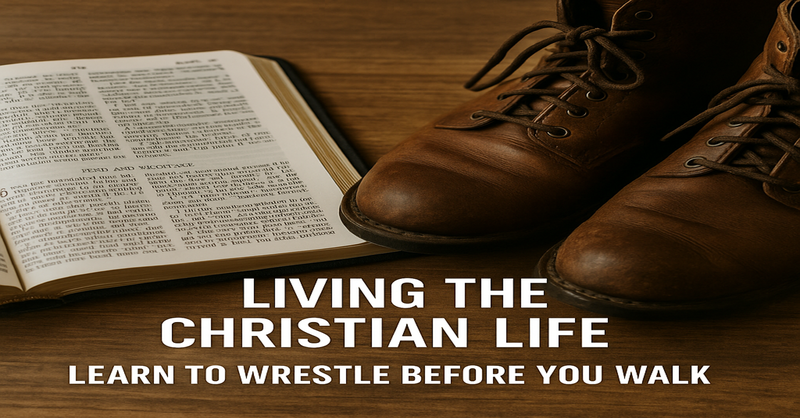
Study Guide: Wrestle, Walk, and the Christian Life
This guide is designed to review and deepen understanding of the core concepts presented in the podcast episode, “Living the Christian Life — Learn to Wrestle Before You Walk.”
Review Quiz
Answer the following questions in 2-3 complete sentences based on the information provided in the source context.
1. What is the central theme of the podcast, encapsulated by its title?
2. According to the host, what is God's actual path to spiritual maturity, as opposed to what many people expect?
3. Briefly summarize the story of Jacob's wrestle from Genesis 32 as it is presented in the podcast.
4. What is the significance of Jacob's new name, "Israel," and the lifelong limp he received?
5. How does the podcast explain the concept of being "born again," which Jesus taught to Nicodemus?
6. What is the "inner battle" described in Segment 4, and what is its significance for a believer?
7. According to the host, how is victory in the daily Christian struggle achieved?
8. What is the purpose of the "spiritual armor" mentioned in Ephesians 6?
9. Name the specific pieces of the spiritual armor listed in the podcast.
10. What is the ultimate purpose of a "wrestling season" in a believer's life?
--------------------------------------------------------------------------------
Answer Key
1. The central theme is that before a person can walk strong in the Christian life, they must first learn to "wrestle." This wrestle involves confronting fear, temptation, and the process of surrender, which is a necessary precursor to a mature faith.
2. God's path to maturity is not instant perfection. Instead, He teaches believers to wrestle with their weaknesses so that His strength can be made evident, much like a baby wobbles and stumbles before learning to walk.
3. In Genesis 32, Jacob, alone and afraid, physically wrestled with a man all night. At dawn, Jacob realized he had been wrestling with God, who touched his hip and caused him to limp for life.
4. Jacob's new name, "Israel," means "one who wrestles with God." His limp was not a mark of defeat but a mark of grace, serving as a permanent reminder that his true strength came from surrender to God, not from his own striving.
5. Being "born again" is described as a spiritual rebirth, not a form of self-improvement. It is the moment God's Spirit enters a person's heart, making them new and initiating the step-by-step process of learning to trust and follow Him.
6. The "inner battle" is the daily tug-of-war between a believer's old sinful nature and the Holy Spirit living inside them, as described by Paul in Romans 7. The podcast states this struggle is not a sign of failure but proof that the person is spiritually alive and belongs to God.
7. Victory is not achieved by trying harder or through self-effort. It comes from "yielding deeper" to God and acknowledging a personal inability, thereby allowing God's power to work through the believer.
8. The spiritual armor is given by God to equip believers to "walk in victory." Its purpose is to help them stand firm against life's challenges and the enemy's attacks by relying on God's power and might.
9. The pieces of spiritual armor listed are: truth, righteousness, peace, faith, salvation, and the Word of God (also called the sword of the Spirit).
10. A "wrestling season" is not a setback but a "shaping ground." God uses these periods of struggle to confront pride, fear, and independence, preparing the person to walk with greater humility, wisdom, compassion, and dependence on Him.
--------------------------------------------------------------------------------
Essay Questions
Reflect on the broader themes of the podcast to construct detailed, essay-format answers to the following prompts. (Answers not provided).
1. Analyze the central metaphor, "Before you walk, you must wrestle." How does the podcast use the examples of a baby learning to stand, Jacob's experience, and the inner battle described by Paul to build a comprehensive picture of this concept?
2. Discuss the significance of the quote, "Before God can use us publicly, He must wrestle with us privately." How does the story of Jacob illustrate this principle, and what does it imply about the nature of personal struggle and public testimony?
3. Explain the progression from "birth" to "wrestle" to "walk" as outlined in the podcast. How do the concepts of being "born again" and the "inner battle" serve as foundational steps before one can "walk in victory"?
4. The podcast makes a distinction between fighting for victory and fighting from victory. Elaborate on this idea using the concepts of Christ's finished work and the spiritual armor from Ephesians 6.
5. Explore the theme of weakness and strength. How does the podcast redefine weakness (like Jacob's limp) as a "mark of grace" and a source of testimony, and how does this contrast with a worldly view of strength?